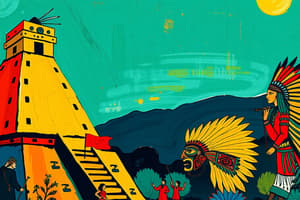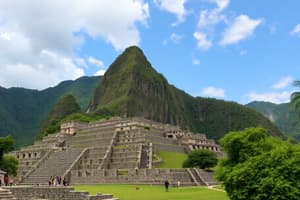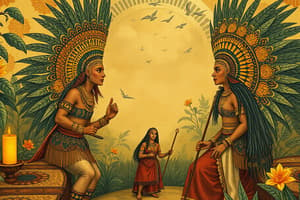Podcast
Questions and Answers
Which crops were cultivated by early American farming cultures?
Which crops were cultivated by early American farming cultures?
- Wheat
- Maize (correct)
- Rice
- Potatoes
What was the capital of the Aztec civilization?
What was the capital of the Aztec civilization?
Tenochtitlan
The Mayans were primarily known for their nomadic lifestyle.
The Mayans were primarily known for their nomadic lifestyle.
False (B)
Which country was led by Prince Henry the Navigator?
Which country was led by Prince Henry the Navigator?
What significant event did Christopher Columbus' voyage in 1492 initiate?
What significant event did Christopher Columbus' voyage in 1492 initiate?
The settlement founded by the London Company was called ______.
The settlement founded by the London Company was called ______.
What role did Jesuit missionaries play in French settlements?
What role did Jesuit missionaries play in French settlements?
Match the colonies with their founders:
Match the colonies with their founders:
What crop significantly affected the economy of the southern colonies?
What crop significantly affected the economy of the southern colonies?
The Columbian Exchange improved conditions for Native Americans.
The Columbian Exchange improved conditions for Native Americans.
During the Columbian Exchange, goods like maize and potatoes were transported from the Americas to ______.
During the Columbian Exchange, goods like maize and potatoes were transported from the Americas to ______.
Which of the following was part of the caste system developed in colonial America?
Which of the following was part of the caste system developed in colonial America?
Flashcards are hidden until you start studying
Study Notes
Native American Societies
- Paleo-Indians arrived in North America approximately 16,000 years ago; settlement and farming began by 7000 BCE.
- Major civilizations included:
- Aztecs (Mexica): Capital was Tenochtitlan; noted for writing, irrigation systems, and human sacrifices to enhance agriculture.
- Mayans: Resided in the Yucatan Peninsula; developed sophisticated irrigation, stone temples, and water storage systems.
- Incas: Established in the Andes; vast empire of 16 million people with advanced road networks and agriculture, notably potatoes.
- Maize became a crucial crop for all major civilizations, spreading across North America.
- Pueblo peoples in New Mexico and Arizona practiced sedentary farming, known for organized societies and masonry.
- Other notable groups included:
- Great Plains: Nomadic hunters and gatherers.
- Pacific Northwest: Engaged in fishing and hunting, lived in longhouses.
- Mississippi River Valley: Mixed agricultural strategies with large trade networks, including Hopewell and Cahokia cultures.
- Iroquois: In Northeast America; grew maize, beans, and squash; lived in longhouses.
European Exploration of America
- Exploration was motivated by population growth, political unity, the quest for luxury goods, and concerns over Muslim-controlled trade routes.
- Portugal:
- Spearheaded by Prince Henry the Navigator, developed sea routes around Africa.
- Established a "Trading Post Empire" with advanced ships.
- Spain:
- After unification, focused on resource exploration and spreading Christianity.
- Christopher Columbus landing in 1492 led to Spanish exploitation of Native peoples.
- France:
- Samuel de Champlain settled in Quebec, preferred trade over conquest.
- Welcomed Jesuit missionaries in indigenous communities, achieving higher conversion rates.
- Engaged in fur trade with Dutch, who established New Amsterdam (modern-day New York).
- England:
- Motivated by economic prospects and religious freedom.
- Jamestown was the first settlement, founded by the London Company, but struggled due to harsh conditions.
- Pilgrims settled in Massachusetts, receiving help from local tribes for survival.
- Massachusetts Bay Colony was formed by Puritans looking for religious freedom, led by John Winthrop. Anne Hutchinson challenged Puritan teachings, leading to her expulsion.
- Other colonies established included Connecticut by Thomas Hooker, Maryland as a refuge for Catholics by the Calvert family, and Carolina, which later split into northern and southern regions.
- The southern economy became plantation-dominated, fueling the Atlantic slave trade.
The Columbian Exchange
- Agricultural exchange involved:
- From Americas to Europe: Maize, potatoes, tomatoes, cacao.
- From Europe/Africa to Americas: Rice, wheat, citrus fruits, and livestock.
- Diseases like smallpox severely impacted Native populations, facilitating European conquests.
- This exchange prompted European wealth, a decline in feudalism, and a rise in capitalism.
- Widespread enslavement of Native Americans and Africans occurred, with Africans transported forcibly via the Middle Passage.
- A caste system emerged:
- Peninsulares: Individuals born in Spain.
- Criollos: Spanish born in America.
- Mestizos: Mixed European and Native ancestry.
- Mulattoes: Mixed European and African ancestry.
- Natives and enslaved Africans at the bottom of the social hierarchy.
Studying That Suits You
Use AI to generate personalized quizzes and flashcards to suit your learning preferences.




